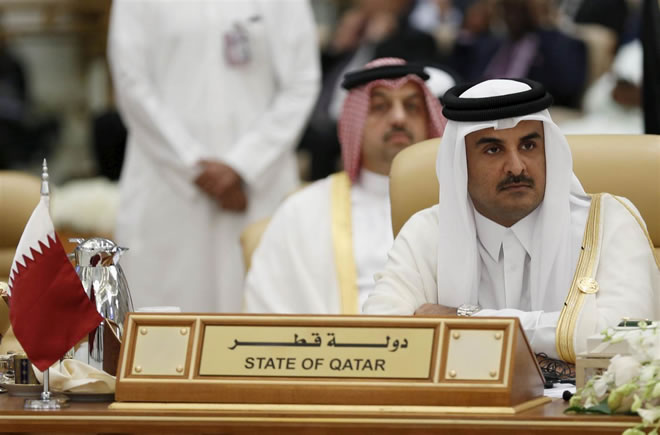
DOHA, June 5: The Arab world’s strongest powers cut ties with Qatar on Monday over alleged support for extremists and Iran, re-opening a festering wound two weeks after US President Donald Trump’s demand for Muslim states to fight terrorism.
Saudi Arabia, Egypt, United Arab Emirates and Bahrain cut relations with Qatar in a coordinated move. Yemen, Libya’s eastern-based government and the Maldives joined in later.
Iran-long at odds with Saudi Arabia-immediately blamed US President Donald Trump for setting the stage during his recent trip to Riyadh.
Gulf Arab states and Egypt have already long resented Qatar’s support for extremists, especially the Muslim Brotherhood which they regard as a dangerous political enemy.
The coordinated move, with Yemen and Libya’s eastern-based government joining in later, created a dramatic rift among the Arab nations, many of which are in OPEC.
Announcing the closure of transport ties with Qatar, the three Gulf states gave Qatari visitors and residents two weeks to leave. Qatar was also expelled from the Saudi-led coalition fighting in Yemen.
Oil giant Saudi Arabia accused Qatar of backing militant groups-some backed by regional arch-rival Iran-and broadcasting their ideology, an apparent reference to Qatar’s influential state-owned satellite channel al Jazeera.
“(Qatar) embraces multiple terrorist and sectarian groups aimed at disturbing stability in the region, including the Muslim Brotherhood, ISIS (Islamic State) and al-Qaeda, and promotes the message and schemes of these groups through their media constantly,” Saudi state news agency SPA said.
It accused Qatar of supporting what it described as Iranian-backed militants in its restive and largely Shi’ite Muslim-populated Eastern region of Qatif and in Bahrain.
“What is happening is the preliminary result of the sword dance,” Hamid Aboutalebi, deputy chief of staff of Iran’s President Hassan Rouhani, tweeted in a reference to Trump’s recent visit to Saudi Arabia.
Trump and other US officials participated in a traditional sword dance during the trip in which he called on Muslim countries to stand united against religious extremists and singled out Iran as a key source of funding and support for militant groups.
US Secretary of State Rex Tillerson told reporters in Sydney on Monday that the spat would not affect the fight against religious militants and that Washington has encouraged its Gulf allies to resolve their differences.
A split between Doha and its closest allies can have repercussions around the Middle East, where Gulf states have used their financial and political power to influence events in Libya, Egypt, Syria, Iraq and Yemen.
The economic fallout loomed immediately, as Abu Dhabi’s state-owned Ethihad Airways, Dubai’s Emirates Airline and budget carrier Flydubai said they would suspend all flights to and from Doha from Tuesday morning until further notice.
Qatar Airways said on its official website it had suspended all flights to Saudi Arabia.
Qatar’s stock market index sank 7.5 percent with some of the market’s top blue chips hardest hit.
The measures are more severe than during a previous eight-month rift in 2014, when Saudi Arabia, Bahrain and the UAE withdrew their ambassadors from Doha, again alleging Qatari support for militant groups. At that time, travel links were maintained and Qataris were not expelled.
The diplomatic broadside threatens the international prestige of Qatar, which hosts a large US military base and is set to host the 2022 World Cup. It has for years presented itself as a mediator and power broker for the region’s many disputes. – Agencies




